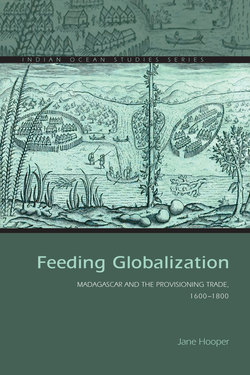Читать книгу Feeding Globalization - Jane Hooper - Страница 9
На сайте Литреса книга снята с продажи.
ОглавлениеAcknowledgments
My interest in Madagascar began years ago, during the time I spent living on a small island off its east coast. My friends in Ambodifotatra on Île Sainte Marie welcomed me into their homes, patiently taught me Malagasy, and showed me how to properly cook rice. Their hospitality, present even when a cyclone was destroying the small island, will forever stick with me. It is to them that I dedicate this book.
The time I spent gazing across the waters of the Indian Ocean encouraged me to think about the ways in which the ocean has united, rather than divided, populations along its shores. Despite my continued interest in this topic, I have been fortunate to work alongside colleagues who study far different portions of the globe. My conversations with them over the years have profoundly shaped my thinking on the place of Madagascar in the world. First, I would like to thank the historians and art historians of George Mason University who helped support my efforts to bring this project to fruition. My colleagues at GMU have been unfailingly generous of time and knowledge. Benedict Carton and Rosemarie Zagarri, despite their own busy schedules, have been particularly helpful in offering comments on parts of this book. I’d also like to thank the members of the history department at Saint Joseph’s University. My time as a David H. Burton fellow provided me with numerous opportunities to discuss my research and writing with the many accomplished historians there. Christopher Close deserves a special thank you for being willing to converse on so many occasions about the challenges involved in studying early modern history. I have benefited from the tireless support and encouragement of Clifton Crais. I am grateful for him and numerous other historians at Emory University, including David Eltis, Kristin Mann, and Roxani Margariti, for providing me with such very different perspectives on the study of history. My discussions with Kate Armstrong, Dana Irwin, Amanda Madden, and Leah Weinryb Grohsgal have also shaped me as a scholar in more ways than I can count. Molly McCullers, a fellow Africanist, has been a particularly invaluable friend throughout this entire process.
If I had not met Richard Allen near the beaches of Zanzibar years ago, I can confidently say this book would not exist, at least not in its current form. I would like to thank him for sharing his enthusiasm, not to mention expertise, over the past several years. I have also benefited immensely from the work of talented and influential Indian Ocean historians such as Edward Alpers, James Armstrong, Gwyn Campbell, Pier Larson, Pedro Machado, and Kerry Ward. Not long ago, taking on a trans-regional research project such as mine seemed inconceivable, but fortunately that is no longer the case. Thanks to their efforts, it is exciting to contemplate the future of Indian Ocean studies as scholars continue to provide new perspectives on the history of the ocean. I would like to thank the director of Ohio University Press, Gillian Berchowitz, and two anonymous readers who have helped me transform my writing into a book. All remaining errors, however, are of course mine.
My family and friends have been a constant support, particularly during periods of travel and focused writing. I would like to thank my parents for their patience and feedback over the years. My husband Josh has given me the time to work while also encouraging me to take the breaks necessary to make it through such a lengthy endeavor. My children, Lizzie and Noah, have also enriched my life considerably by guaranteeing daily singing, dancing, and laughter to interrupt the sometimes weighty topics discussed in this book.
